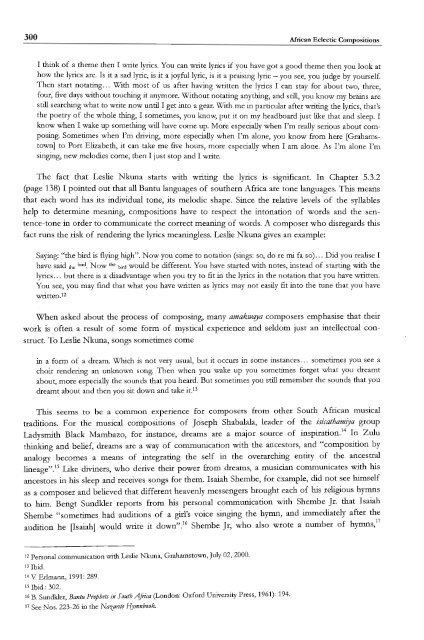South African Choral Music (Amakwaya): Song, Contest and the ...
South African Choral Music (Amakwaya): Song, Contest and the ...
South African Choral Music (Amakwaya): Song, Contest and the ...
Create successful ePaper yourself
Turn your PDF publications into a flip-book with our unique Google optimized e-Paper software.
300 Mrican Eclectic Compositions<br />
I think of a <strong>the</strong>me <strong>the</strong>n I write lyrics. You can write lyrics if you have got a good <strong>the</strong>me <strong>the</strong>n you look at<br />
how <strong>the</strong> lyrics are. Is it a sad lyric, is it a joyful lyric, is it a praising lyric - you see, you judge by yourself.<br />
Then start notating... With most of us after having written <strong>the</strong> lyrics I can stay for about two, three,<br />
four, five days without touching it anymore. Without notating anything, <strong>and</strong> still, you know my brains are<br />
still searching what to write now until I get into a gear. With me in particular after writing <strong>the</strong> lyrics, that's<br />
<strong>the</strong> poetry of <strong>the</strong> whole thing, I sometimes, you knO\\', put it on my headboard just like that <strong>and</strong> sleep. I<br />
know when I wake up something will have come up. More especially when I'm really serious about composing.<br />
Sometimes when I'm driving, more especially when I'm alone, you know from here [Grahamstown]<br />
to Port Elizabeth, it can take me five hours, more especially when I am alone. As I'm alone I'm<br />
singing, new melodies come, <strong>the</strong>n I just stop <strong>and</strong> I write.<br />
The fact that Leslie Nkuna starts with writing <strong>the</strong> lyrics is significant. In Chapter 5.3.2<br />
(page 138) I pointed out that all Bantu languages of sou<strong>the</strong>rn Africa are tone languages. This means<br />
that each word has its individual tone, its melodic shape. Since <strong>the</strong> relative levels of <strong>the</strong> syllables<br />
help to determine meaning, compositions have to respect <strong>the</strong> intonation of words <strong>and</strong> <strong>the</strong> sen<br />
tence-tone in order to communicate <strong>the</strong> correct meaning of words. A composer who disregards this<br />
fact runs <strong>the</strong> risk of rendering <strong>the</strong> lyrics meaningless. Leslie Nkuna gives an example:<br />
Saying: "<strong>the</strong> bird is flying high". Now you come to notation (sings: so, do re mi fa so) ... Did you realise I<br />
have said <strong>the</strong> bird. Now <strong>the</strong> bird would be different. You have started with notes, instead of starting with <strong>the</strong><br />
lyrics ... but <strong>the</strong>re is a disadvantage when you try to fit in <strong>the</strong> lyrics in <strong>the</strong> notation that you have written.<br />
You see, you may find that what you have written as lyrics may not easily fit into <strong>the</strong> tune that you have<br />
written. 12<br />
When asked about <strong>the</strong> process of composing, many amakwqya composers emphasise that <strong>the</strong>ir<br />
work is often a result of some form of mystical experience <strong>and</strong> seldom just an intellectual con<br />
struct. To Leslie Nkuna, songs sometimes come<br />
in a form of a dream. Which is not very usual, but it occurs in some instances ... sometimes you see a<br />
choir rendering an unknown song. Then when you wake up you sometimes forget what you dreamt<br />
about, more especially <strong>the</strong> sounds that you heard. But sometimes you still remember <strong>the</strong> sounds that you<br />
dreamt about <strong>and</strong> <strong>the</strong>n you sit down <strong>and</strong> take it)3<br />
This seems to be a common experience for composers from o<strong>the</strong>r <strong>South</strong> <strong>African</strong> musical<br />
traditions. For <strong>the</strong> musical compositions of Joseph Shabalala, leader of <strong>the</strong> isicathamrya group<br />
Ladysmith Black Mambazo, for instance, dreams are a major source of inspiration. 14 In Zulu<br />
thinking <strong>and</strong> l?elief, dreams are a way of communication with <strong>the</strong> ancestors, <strong>and</strong> "composition by<br />
analogy becomes a means of integrating <strong>the</strong> self in <strong>the</strong> overarching entity of <strong>the</strong> ancestral<br />
lineage".15 Like diviners, who derive <strong>the</strong>ir power from dreams, a musician communicates with his<br />
ancestors in his sleep <strong>and</strong> receives songs for <strong>the</strong>m. Isaiah Shembe, for example, did not see himself<br />
as a composer <strong>and</strong> believed that different heavenly messengers brought each of his religious hymns<br />
to him. Bengt Sundkler reports from his personal communication with Shembe Jr. that Isaiah<br />
Shembe "sometimes had auditions of a girl's voice singing <strong>the</strong> hymn, <strong>and</strong> immediately after <strong>the</strong><br />
audition he [Isaiah] would write it down".16 Shembe Jr, who also wrote a number of hymns,17<br />
12 Personal communication with Leslie Nkuna, Grahamstown, July 02, 2000.<br />
13 Ibid.<br />
14 V Erlmann, 1991: 289.<br />
15 Ibid.: 302.<br />
16 B. Sundkler, Bantu Prophets in <strong>South</strong> Africa (London: Oxford University Press, 1961): 194.<br />
17 See .os. 223-26 in <strong>the</strong> Nazarite Hymnbook.

















